unit 5语言应用
高中英语Unit 5 The power of nature知识讲解 话题语言应用——自然灾害与预防利用教案
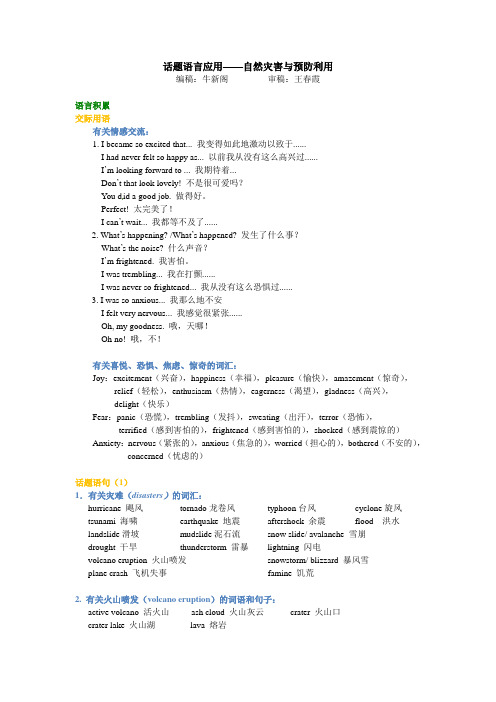
话题语言应用——自然灾害与预防利用编稿:牛新阁审稿:王春霞语言积累交际用语有关情感交流:1. I became so excited that... 我变得如此地激动以致于......I had never felt so happy as... 以前我从没有这么高兴过......I’m looking forward to ... 我期待着...Don’t that look lovely! 不是很可爱吗?You d id a good job. 做得好。
Perfect! 太完美了!I can’t wait... 我都等不及了......2. What’s happening? /What’s happened? 发生了什么事?What’s the noise? 什么声音?I’m frightened. 我害怕。
I was trembling... 我在打颤......I was never so frightened... 我从没有这么恐惧过......3. I was so anxious... 我那么地不安I felt very nervous... 我感觉很紧张......Oh, my goodness. 哦,天哪!Oh no! 哦,不!有关喜悦、恐惧、焦虑、惊奇的词汇:Joy:excitement(兴奋),happiness(幸福),pleasure(愉快),amazement(惊奇),relief(轻松),enthusiasm(热情),eagerness(渴望),gladness(高兴),delight(快乐)Fear:panic(恐慌),trembling(发抖),sweating(出汗),terror(恐怖),terrified(感到害怕的),frightened(感到害怕的),shocked(感到震惊的)Anxiety:nervous(紧张的),anxious(焦急的),worried(担心的),bothered(不安的),concerned(忧虑的)话题语句(1)1.有关灾难(disasters)的词汇:hurricane 飓风tornado龙卷风typhoon台风cyclone旋风tsunami 海啸 earthquake 地震aftershock 余震flood 洪水landslide滑坡mudslide泥石流snow slide/ avalanche 雪崩drought 干旱thunderstorm 雷暴 lightning 闪电volcano eruption 火山喷发snowstorm/blizzard 暴风雪plane crash 飞机失事famine 饥荒2. 有关火山喷发(volcano eruption)的词语和句子:active volcano 活火山ash cloud 火山灰云crater 火山口crater lake 火山湖lava 熔岩Red hot lava was fountain ing hundreds of metres into the air.红色发烫的岩浆像喷泉一样,朝天上喷射达几百米高。
unit5 warming up语言点
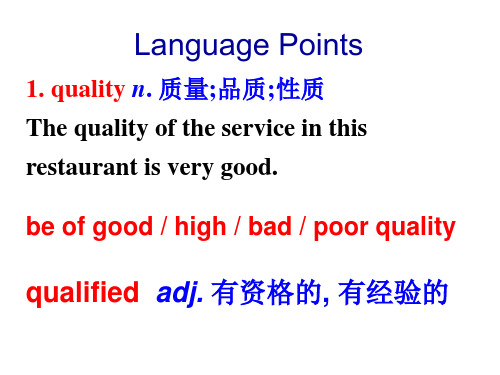
What do you mean by (doing) sth? What do you mean by yive 积极的, 活跃的 He is an active member of the soccer club. 他是足球俱乐部的一名活 跃分子。 take an active part in 积极参加 be active in 在……方面很积极 4. generous adj. 慷慨的, 大方的 generously adv. generosity n be generous to do sth 做某事很慷 慨, 大方 be generous with 对……慷慨, 大方
Language Points
1. quality n. 质量;品质;性质
The quality of the service in this
restaurant is very good. be of good / high / bad / poor quality
qualified adj. 有资格的, 有经验的
Mandela used to work as a lawyer and
helped many poor black people. act as 担任, 充当
9. found found (founded, founded) 建立, 创建 find (found, found) 找到 The hospital was founded in 1920. Have you found your missing pen? • be founded on/upon 建立在……基础上, • 以……为基础 • The story is founded on/upon facts.
6. He died for his ideas but his work is still used in the official Bible today. 他为了自己的思想而献身, 但他的成果 后来应用于《圣经》。 die for 为……而死 They died for the people; their death is weightier than Mount Taishan. be dying for 渴望 I am dying for a cup of water.
最新高一英语必修二Unit-5-Music-Warming-up的教学设计

高一英语必修二U n i t-5-M u s i c-W a r m i n g-u p的教学设计高一英语必修二Unit 5 Music Warming up的教学设计中宁中学胡志存一.教材依据教学内容:人民教育出版社普通高中课程标准实验教科书高一英语必修二Unit 5 Music warming up的教学设计二.设计思想本单元的教学话题是“音乐”。
“热身”(Warming up)部分介绍了多种多样的音乐形式,“阅读”(Reading)部分介绍了美国著名的乐队“The Monkees”(门基组合)的诞生极其发展历程,在“语言应用”(Using Languange)部分又安排了一篇青蛙乐队的故事,目的是让学生进一步感受一只乐队的成功及成名的烦恼。
每当谈论音乐时,大部分学生都会狭义的理解为流行音乐,他们对流行歌手和组合及他们演唱的歌曲和音乐十分熟悉,且极为感兴趣。
新课标的理念是以人为本,教师在课堂上要激发学生的兴趣,充分调动学生的积极性,创设一个宽松的学习氛围,给他们一个充分展示个人才能的机会,使学生在和谐、民主的学习环境中学会合作学习。
基于上述原因,我利用多媒体课件容量大的特点对本单元的第一课时作了如下设计:一:上课伊始,我利用学生对流行音乐熟悉和痴迷的特点让他们听几位流行歌手演唱的歌曲,让他们说出歌手和歌曲的名字,激发他们的兴趣,调动他们参与的积极性,使课堂气氛立刻活跃起来。
二:接下来让他们以小组的形式来讨论古今中外的歌手、音乐家和他们演唱的作品,使学生更多地了解90年代以前中国的许多音乐家及知名的歌手。
三:为了使课堂气氛达到高潮,给学生一个充分展示个人才能的机会,我请一些有特长的学生演唱他们喜爱的歌曲和乐器,让学生对常见乐器和乐器的名称有个大概的了解。
四:接下来让他们观看中国知名乐队“零点乐队”的演奏,从而引出其他乐队和“The Beatles”(甲克虫乐队),为下节课学习了解“The Monkees”(门基组合乐队)的诞生极其发展历程打下基础。
初二英语上册unit5公开课教案
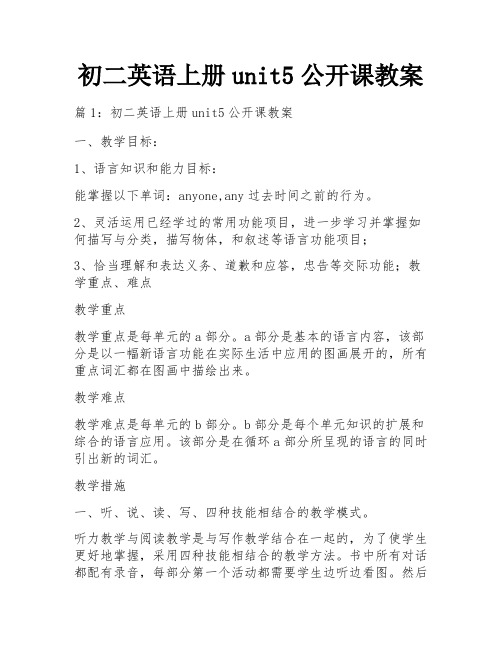
初二英语上册unit5公开课教案篇1:初二英语上册unit5公开课教案一、教学目标:1、语言知识和能力目标:能掌握以下单词:anyone,any过去时间之前的行为。
2、灵活运用已经学过的常用功能项目,进一步学习并掌握如何描写与分类,描写物体,和叙述等语言功能项目;3、恰当理解和表达义务、道歉和应答,忠告等交际功能;教学重点、难点教学重点教学重点是每单元的a部分。
a部分是基本的语言内容,该部分是以一幅新语言功能在实际生活中应用的图画展开的,所有重点词汇都在图画中描绘出来。
教学难点教学难点是每单元的b部分。
b部分是每个单元知识的扩展和综合的语言应用。
该部分是在循环a部分所呈现的语言的同时引出新的词汇。
教学措施一、听、说、读、写、四种技能相结合的教学模式。
听力教学与阅读教学是与写作教学结合在一起的,为了使学生更好地掌握,采用四种技能相结合的教学方法。
书中所有对话都配有录音,每部分第一个活动都需要学生边听边看图。
然后让学生确认录音中提及的物体,说话人或被谈话人,或者填出确实单词。
二、开展结对活动和小组活动可以为学生分配搭档,也可以让他们自己选择,在开展结队活动之前,要确保每个人都要理解词汇的意义并指导活动如何进行。
三、运用先学后教,当堂训练的教学模式,精讲基础知识,加强基本训练,培养运用语言交际的能力。
在训练中,要尽量使语言形式与语言本身相联系,不要做过多地语法及语言形式的练习。
四、教学具体措施1、摸清学生基本情况,逐步激励学生对英语产生学习兴趣。
2、重视课堂教学质量,逐步提高学生英语交际能力。
3、有意识培养学生听力、表述、朗读、书写和作业的基本能力。
4、重视思维过程系统编排,由浅入深,由易到难,由已知到未知,循序渐进,点面结合,逐步扩展,循环往现,以加深影响。
篇2:初二英语上册unit5公开课教案教学目标:1.会使用可数名词和不可数名词开购物单。
为后两课学习购物做准备。
2. 学会讨论吃什么饭,买什么东西。
牛津上海版英语八年级上册《Unit 5 Encyclopaedias》教学设计1
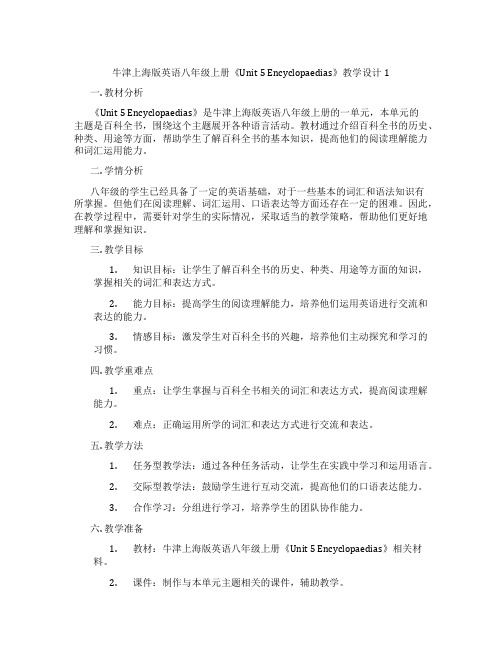
牛津上海版英语八年级上册《Unit 5 Encyclopaedias》教学设计1一. 教材分析《Unit 5 Encyclopaedias》是牛津上海版英语八年级上册的一单元,本单元的主题是百科全书,围绕这个主题展开各种语言活动。
教材通过介绍百科全书的历史、种类、用途等方面,帮助学生了解百科全书的基本知识,提高他们的阅读理解能力和词汇运用能力。
二. 学情分析八年级的学生已经具备了一定的英语基础,对于一些基本的词汇和语法知识有所掌握。
但他们在阅读理解、词汇运用、口语表达等方面还存在一定的困难。
因此,在教学过程中,需要针对学生的实际情况,采取适当的教学策略,帮助他们更好地理解和掌握知识。
三. 教学目标1.知识目标:让学生了解百科全书的历史、种类、用途等方面的知识,掌握相关的词汇和表达方式。
2.能力目标:提高学生的阅读理解能力,培养他们运用英语进行交流和表达的能力。
3.情感目标:激发学生对百科全书的兴趣,培养他们主动探究和学习的习惯。
四. 教学重难点1.重点:让学生掌握与百科全书相关的词汇和表达方式,提高阅读理解能力。
2.难点:正确运用所学的词汇和表达方式进行交流和表达。
五. 教学方法1.任务型教学法:通过各种任务活动,让学生在实践中学习和运用语言。
2.交际型教学法:鼓励学生进行互动交流,提高他们的口语表达能力。
3.合作学习:分组进行学习,培养学生的团队协作能力。
六. 教学准备1.教材:牛津上海版英语八年级上册《Unit 5 Encyclopaedias》相关材料。
2.课件:制作与本单元主题相关的课件,辅助教学。
3.学具:为学生准备相关的学习用品,如笔记本、词典等。
七. 教学过程1.导入(5分钟)利用课件展示一些百科全书的照片,引导学生谈论百科全书的话题,激发他们的学习兴趣。
2.呈现(10分钟)教师通过阅读文章,向学生介绍百科全书的历史、种类、用途等方面的知识,并在课堂上进行讲解和演示。
3.操练(15分钟)学生分组进行讨论,用英语表述百科全书的优点和不足,教师巡回指导,纠正发音和语法错误。
Unit+5+Using+language+教学设计 高中英语外研版(2019)必修第三册

必修三Unit 5 What an adventure!Using language教学设计课题Using language:课标理念本单元属于人与自然的主题语境下关于人与自我的探讨,关于讨论探险家的探险天性、探险意义和探险精神。
本课以学习理解、应用实践、合作探究、迁移创新等方式来发展学生听、说、读、写的综合技能。
内容分析Using language第一部分Past future:通过复习上节课所学文章中的两个句子来引入过去将来时,再通过教科书上的活动来引入第二部分。
第二部分First aid:通过对新单词的意思的讲解,引导学生完成活动五。
第三部分Amazing road trips:通过听一段关于一群人骑318国道为孩童慈善筹款的采访,激活学生的兴趣,了解探险的不易和其探险精神以及探究冒险精神背后的涵义。
教学目标 1.学生能够了解将来时的各种形式,掌握各种形式的适用范围,并正确运用所学语法知识完成语言的输出,达到知识的融会贯通。
2.学生能够在丰富多样的教学任务中循序渐进地对本单元的语法知识进行认识、理解、分析,并在具体的语言环境中对其加以灵活运用,实现将知识内化于心,而外化于行。
3.学生能在小组合作学习的过程中培养自己的团队合作意识。
4.学生能够在自主学习的过程中锻炼自己的独立思考和解决问题的能力。
教学重点 1.学生能正确区分过去将来时的不同形式,并在具体的语境中去灵活运用。
2.理解听力材料表达的主要观点,能够基于听力材料内容内容形成自己的观点并发表看法。
教学难点 1.语法项目的不同形式在不同语言环境中的使用2.引导学生提炼出探险家的优秀品格,学习其探险精神并能联系实际生活和学习。
教学过程教学步骤教学活动设计意图Step-1 Warm up 1.Review the passage of the last class and point out twogroups of sentences and ask Ss the questions:What is the difference between the two groups ofsentences?通过复习上节课的相关知识,激发学生的原有图式。
(人教版)高中英语必修4:Unit 5 Theme parks话题语言应用--“公园”写作训练
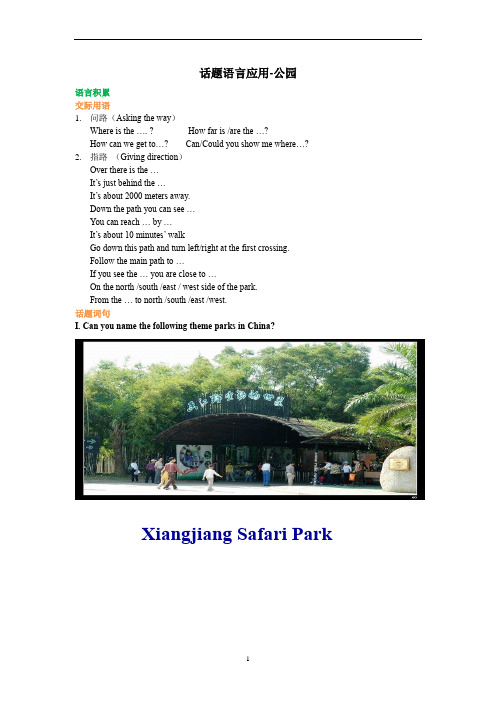
话题语言应用-公园语言积累交际用语1.问路(Asking the way)Where is the …. ? How far is /are the …?How can we get to…? Can/Could you show me where…?2.指路(Giving direction)Over there is the …It’s just behind the …It’s about 2000 meters away.Down the path you can see …You can reach … by …It’s about 10 minutes’ walkGo down this path and turn left/right at the first crossing.Follow the main path to …If you see the … you are close to …On the north /south /east / west side of the park.From the … to north /south /east /west.话题词句I. Can you name the following theme parks in China?Xiangjiang Safari ParkChina Folk Culture villageShenzhen Splendid ChinaII. More about theme parks有关主题公园1. What is a theme park?A theme park has a certain idea, a certain theme that the whole park is based on.2. What kinds of theme parks people have already designed?We have already had sports, culture, science, cartoons, movies or history theme parks.More Themes: amusement/ entertainment ;folk custom (民俗);nature3. What kind of activities do people do in a park?People have fun with each other, play chess, play games, listen to birds ’ singing or just relax a bit.4. Purposes of different kinds of parksProviding people with a place to amuse themselves and escape their busy life for a while.We have a walk in our spare time.South China BotanicalHappy valleyWe can enjoy beautiful scenery.5. Ways to meet this needVarious ways, such as providing quiet places with trees and lakes, family can come to have a picnic.6. A sports theme park offers visitors sports to play or watch. Its purpose is to involve visitors inphysical exercise and athletic competition.7. In a history or culture theme park, we might go for rides on animals, help cook cultural foods orhave our pictures taken in the clothing of emperors (皇帝) or of minority (少数民族).Perhaps we can see how ancestors dressed, worked and lived in a history theme park.8. The oldest theme park in the world is Disneyland. Both children and adults enjoyed seeing thecharacters from Disney films. Disneyland has exciting rides, visits to castles and chances to get close to life-size cartoon figures.9. In a science theme park, visitors can take an active part in the experiments.10. In a future park, people can go on imaginary trips to space and use advanced computertechniques to experience life in the future.11. In an ocean theme park, we can see and swim with dolphins and learn about ocean life.12. a traditional Chinese park 传统的中国公园---a common park 普通公园III. Different theme parks1. A Unique Theme Park(独一无二的主题公园)As soon as our shuttle1 got close to the theme park by the freeway, everyone came to life and put on cloth sneakers in advance for an outing. Our translator paid for the admission, and we started enjoying the various attractions in the sunlight.According to the travel brochure, this unique park is famous for its well preserved minority culture. We experienced many deeds of the early settlers, such as swinging across rivers, hunting creatures in the jungle, or taking part in swords fighting tournaments (比武).This park is also famous for its wooden souvenirs. Whichever we bought in the central shop was made of wood, and wherever we went we could see minority carpenters working. They made wooden tools, wooden cartoon figures, wooden athletic products and so on. They even built a huge wooden engine with a length of 20 metres, which was modeled after a real one.This theme park is really a fantasy amusement park. No wonder it has become the brand of local tourism.注1:shuttle 短途穿梭运行的飞机、火车或汽车2. The biggest animal theme park in North AmericaWelcome to our animal kingdom theme park. You can find us twenty-five kilometers west of Kingston on highway 401. We are the biggest animal theme park in North America, and we can show you animals from all over the world.The main idea in our theme park is the preservation of endangered species, so we have special areas to allow these animals to live in a natural setting. We hope they will reproduce themselves and that we can save some of these species. Just beyond the wild area, we have an area with domestic animal where you can walk among them, watch the cows and goats being milked and play with the young animals. You will enjoy seeing the baby animals play and you can feed the horse and goats. You can reach the tropical bird building by going to your left and up the hill.We have birds of all sizes and colours, and have taught some of them to speak.There are rides at the north end of the park, including a merry-go-round, a roller-coaster and for those who do not like speed, a ride in a wagon pulled by our big work horses.The entrance fee is ten dollars for adults and six dollars for children, and each activity costs two dollars.We hope you enjoy your visit.3. Germany's largest theme park!(2018 河北故城县高级中学月考)Welcome to Germany's largest theme park! In an area covering 68 hectares, visitors to Europe Park can experience the architecture, plants and culture of 12 European countries.Set in various themed areas, the popular leisure (休闲) park provides over 100 attractions and wonderful shows. Visitors can take a leisure walk through Italy, France, Spain, Portugal and Scandinavia in one afternoon!Visitors can experience the rush of our high speed roller coasters, watch various acrobatic (杂技的) shows in our international programs, get lost in the underwater world from their seat in the 4D cinema, or experience many of our spectacular attractions. You are sure to make a lasting impression on your children and family.“Atlantis Adventure”---an interactive theme ride for the whole family. Deep below the Greek Village, “Atlantis Adventure” is waiting for all brave hunters.Legend or history? Following the myth of Atlantis, visitors can get to the bottom of one of the world's great mysteries in vehicles which can rotate 360°. Trying to reveal the myth of Atlantis, this adventure takes the visitors past extraordinary scenes with amazingly-beautiful coral reefs, sunken ships and groups of colourful fish. Be fascinated by the amazing animation (动画) and computer technology used in this fantastic ride! (Children 8 years ofage and under must be accompanied by an adult.)写作运用在英语写作中活用谚语的技巧一、引用谚语的技巧1. 用as the saying goes来引出谚语,其意为“常言道”“正如有句谚语所说”;它可以放在句首,也可以放在句末,有时也可放在句子中间。
牛津译林版英语七下Unit 5《Amazing things》(Grammar)教学设计
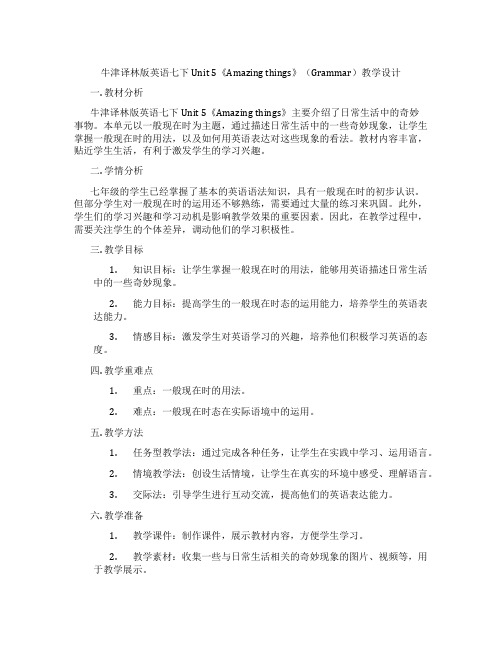
牛津译林版英语七下Unit 5《Amazing things》(Grammar)教学设计一. 教材分析牛津译林版英语七下Unit 5《Amazing things》主要介绍了日常生活中的奇妙事物。
本单元以一般现在时为主题,通过描述日常生活中的一些奇妙现象,让学生掌握一般现在时的用法,以及如何用英语表达对这些现象的看法。
教材内容丰富,贴近学生生活,有利于激发学生的学习兴趣。
二. 学情分析七年级的学生已经掌握了基本的英语语法知识,具有一般现在时的初步认识。
但部分学生对一般现在时的运用还不够熟练,需要通过大量的练习来巩固。
此外,学生们的学习兴趣和学习动机是影响教学效果的重要因素。
因此,在教学过程中,需要关注学生的个体差异,调动他们的学习积极性。
三. 教学目标1.知识目标:让学生掌握一般现在时的用法,能够用英语描述日常生活中的一些奇妙现象。
2.能力目标:提高学生的一般现在时态的运用能力,培养学生的英语表达能力。
3.情感目标:激发学生对英语学习的兴趣,培养他们积极学习英语的态度。
四. 教学重难点1.重点:一般现在时的用法。
2.难点:一般现在时态在实际语境中的运用。
五. 教学方法1.任务型教学法:通过完成各种任务,让学生在实践中学习、运用语言。
2.情境教学法:创设生活情境,让学生在真实的环境中感受、理解语言。
3.交际法:引导学生进行互动交流,提高他们的英语表达能力。
六. 教学准备1.教学课件:制作课件,展示教材内容,方便学生学习。
2.教学素材:收集一些与日常生活相关的奇妙现象的图片、视频等,用于教学展示。
3.练习题:准备一些练习题,用于巩固所学知识。
七. 教学过程1.导入(5分钟)利用课件展示一些奇妙的日常现象,如彩虹、日出等,引导学生关注本节课的主题。
然后用提问的方式引入一般现在时,让学生思考如何用英语描述这些现象。
2.呈现(10分钟)讲解一般现在时的概念,并通过示例让学生理解一般现在时的用法。
示例:描述日常生活中的习惯动作,如“I get up at 7 o’clock every morning.”。
Unit5LanguagesAroundtheWorld单元词汇与话题写作高中英语人教版
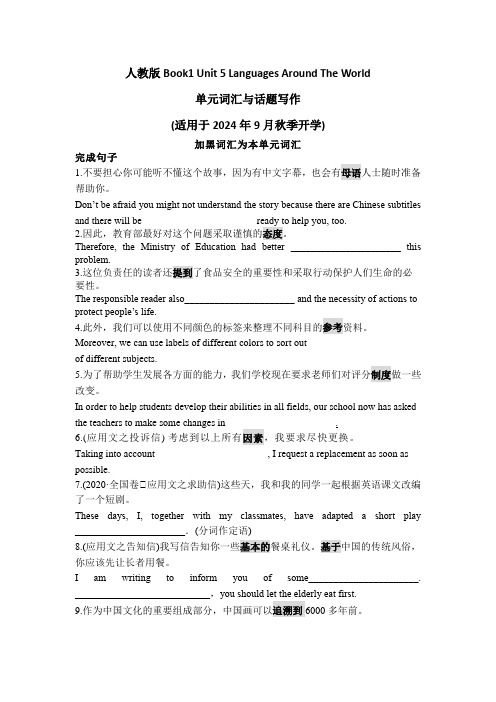
人教版Book1 Unit 5 Languages Around The World单元词汇与话题写作(适用于2024年9月秋季开学)加黑词汇为本单元词汇完成句子1.不要担心你可能听不懂这个故事,因为有中文字幕,也会有母语人士随时准备帮助你。
Don’t be afraid you might not understand the story because there are Chinese subtitles and there will be ______________________ ready to help you, too.2.因此,教育部最好对这个问题采取谨慎的态度。
Therefore, the Ministry of Education had better ______________________ this problem.3.这位负责任的读者还提到了食品安全的重要性和采取行动保护人们生命的必要性。
The responsible reader also______________________ and the necessity of actions to protect people’s life.4.此外,我们可以使用不同颜色的标签来整理不同科目的参考资料。
Moreover, we can use labels of different colors to sort out______________________ of different subjects.5.为了帮助学生发展各方面的能力,我们学校现在要求老师们对评分制度做一些改变。
In order to help students develop their abilities in all fields, our school now has asked the teachers to make some changes in______________________.6.(应用文之投诉信) 考虑到以上所有因素,我要求尽快更换。
高考英语一轮复习Unit5Firstaid课件新人教版必修5

4. apply vt.涂;敷;应用;运用 vi.申请;请求;使用;有效 教材原句 He slowed the bleeding by applying pressure to the wounds until the police and ambulance arrived.他按住伤口,使血流得慢些,一直等到警察和救护 车的到来。
3. treat v.治疗;对待;款待 n.款待,招待 教材原句 John used these to treat the most severe injuries to Ms Slade’s hands.约翰 用这些东西单句填空 ①Police say they are treating it as a case of attempted murder. ②She was always treating him to ice cream.
用法点拨
first aid急救 with the aid of...在……的帮助下 without sb.’ s aid没有某人的帮助 go to sb.’ s aid帮助某人 in aid of为了帮助 aid sb.in/with(doing)sth.帮助某人(做)某事 give first aid进行急救
③They had just covered three miles when they realized (realize) they had left their IDs at home. 单句改错 ④I was about to turn off the gas while you called me. while→when 一句多译 我正要放弃,这时老师鼓励我不要灰心。 ⑤ I was about to give up when the teacher encouraged me not to lose heart. (be about to do...when...) ⑥ I was on the point of giving up when the teacher encouraged me not to lose heart. (be on the point of doing...when...)
人教版高中英语【必修二】[unit5 music 语言应用(人物生平)
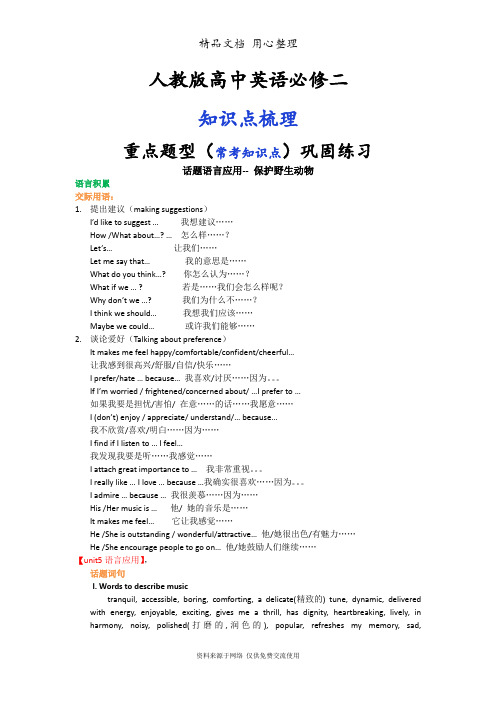
人教版高中英语必修二知识点梳理重点题型(常考知识点)巩固练习话题语言应用-- 保护野生动物语言积累交际用语:1.提出建议(making suggestions)I’d like to suggest …我想建议……How /What about…? …怎么样……?Let’s…让我们……Let me say that…我的意思是……What do you think…? 你怎么认为……?What if we … ? 若是……我们会怎么样呢?Why don’t we …? 我们为什么不……?I think we should…我想我们应该……Maybe we could…或许我们能够……2.谈论爱好(Talking about preference)It makes me feel happy/comfortable/confident/cheerful…让我感到很高兴/舒服/自信/快乐……I prefer/hate … because…我喜欢/讨厌……因为。
If I’m worried / frightened/concerned about/ …I prefer to …如果我要是担忧/害怕/ 在意……的话……我愿意……I (don’t) enjoy / appreciate/ understand/… because…我不欣赏/喜欢/明白……因为……I find if I listen to … I feel…我发现我要是听……我感觉……I attach great importance to …我非常重视。
I really like … I love … because …我确实很喜欢……因为。
I admire … because …我很羡慕……因为……His /Her music is …他/ 她的音乐是……It makes me feel…它让我感觉……He /She is outstanding / wonderful/attractive…他/她很出色/有魅力……He /She encourage people to go on…他/她鼓励人们继续……【unit5语言应用】,话题词句I. Words to describe musictranquil, accessible, boring, comforting, a delicate(精致的) tune, dynamic, delivered with energy, enjoyable, exciting, gives me a thrill, has dignity, heartbreaking, lively, in harmony, noisy, polished(打磨的,润色的), popular, refreshes my memory, sad,sentimental(多愁善感的), serious, shabby(低劣的), slow, harsh(刺耳的)2.Sentences to describe musicThe strong beat will make you excited.This song is melodious and peaceful.It is like the sound from heaven.It is like a whisper near your ear.It puts me in a good mood.I feel enchanted with every second of the song.It soothes my soul.II. Different types/genres of music•C lassical music Jazz•C ountry music•C horal•O pera music•T echno music•R ock ‘n’ Roll•R ap•F olk music•B luesIII. The Effects of MusicMusic is a big part of our lives. We use it for special occasions and to set the mood in movies and television shows. Music can help us pass the time or connect us to our roots. Listening to music takes the whole brain, and has many positive and beneficial effects.•H eals - Music can reduce chronic pain and improve depression. It does this by making the body release endorphins, slowing the breathing and heart rate, distracts the patient, and helps give the patient a feeling of control. It can strengthen the immune system and reduce blood pressure.•M akes you smarter - Music can help you learn better in reading, math, and reasoning skills. It can also improve memory. Certain types of music stimulate both sides of the brain, thereby enhancing learning, concentration, and retention. Musical training improves memory even more than just listening.•I mproves physical performance - There is a reason why you see people running while listening to their iPod. Music decreases fatigue and improves motor reflexes. It can help people with movement disorders.•I mprove productivity - Certain kinds of music lessen fatigue. Music can increase productivity by making workers mentally sharper.•C alms - Music can calm and relax. It reduces stress and negative emotions. It can also help you meditate.•I mproves moods - Music can lessen depression. Research is proving what many cultures have known; that music heals and has positive psychotherapeutic uses.•H ere are some words that describe what music can do to you and for you: soothe, excite, relax, stimulate, meditate, calm, enlighten, frighten, help you refocus, invigorate, stir your imagination, make you happy, lift your mood, restore, cure, heal, empower, stir, incite, lift your spirits, make you more alert, exhilarate, and bring about practically anyemotion.•I n summary, music is a lot more than a soundtrack to our lives; it is an integral part of our lives. Can you imagine a movie without some music? Would there even be entertainment without music? If you want to be healthy and smart, then music is the key.What people have known since ancient times is now being proven by research. Music is good for the body and soul.拓展训练Classical musicClassical music is a broad term that usually refers to mainstream music produced in, or rooted in the traditions of Western liturgical and secular music, encompassing a broad period from roughly the 9th century to present times. The central norms of this tradition became codified between 1550 and 1900, which is known as the common practice period.European music is largely distinguished from many other non-European and popular musical forms by its system of staff notation, in use since about the 16th century. Western staff notation is used by composers to prescribe to the performer the pitch, speed, meter, individual rhythms and exact execution of a piece of music. This leaves less room for practices, such as improvisation and ad libitum ornamentation, that are frequently heard in non-European art music (compare Indian classical music and Japanese traditional music) and popular music.The public taste for and appreciation of formal music of this type waned in the late 1900s in the United States and United Kingdom in particular. Certainly this period has seen classical music falling well behind the immense commercial success of popular music, in the opinion ofsome[who?], although the number of CDs sold is not indicative of the popularity of classical music.The term "classical music" did not appear until the early 19th century, in an attempt to "canonize" the period from Johann Sebastian Bach to Beethoven as a golden age. The earliest reference to "classical music" recorded by the Oxford English Dictionary is from about 1836. Many writers feel that "classical" is an inappropriate term for mainstream and avant-garde music written since the latter part of the 19th century; hence the common usage of scare quotes.写作运用如何写征求建议的信件(Practical writing:asking for advice)征求建议的信件属于应用文,是指写信人就某一个问题向收信人征求建议,希望对方给出有针对性的解决办法,或者提出合理化的建议。
Unit 5 First aid 话题语言应用——急救 知识讲解
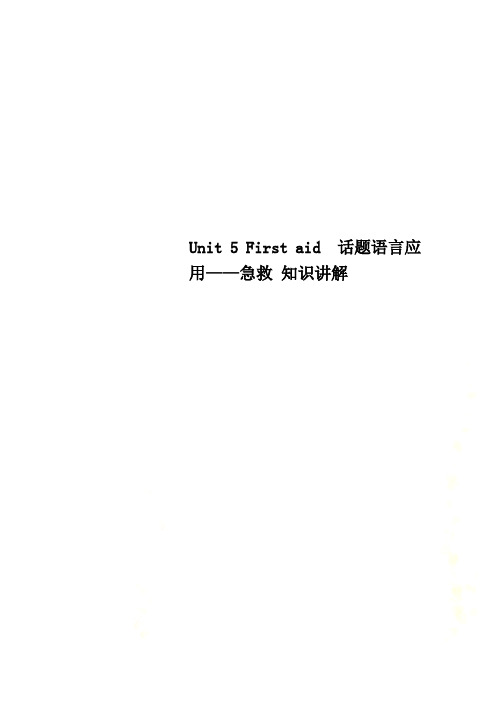
Unit 5 First aid 话题语言应用——急救知识讲解Unit 5 First aid话题语言应用——急救语言积累交际用语用于指示(Giving instructions)的句型:Now listen carefully .... 现在认真听着.......Follow these instructions. 按说明做。
Watch out for .... 注意/当心.......Look out for ... and .... 密切注意......然后......Don’t ... because .... 不要......,因为......Make sure that .... 要确定(保)......Take care to .... 当心......If it is ... go to the hospital. 如果......,就去医院。
Be careful (not) to .... 小心(不)要......Mind you do / don’t .... 留心你(不)要......Cover ... with .... 用......盖上Never .... 一定不要......It’s better to do ... 做......更好。
话题词句1. 有关危急事件和疾病的词汇:emergency 紧急事件bites and scratches 咬伤和抓伤blister 水泡pressure 压力2. 有关急救的词汇:ambulance 救护车first aid 急救ointment 药膏,油膏treat 治疗apply 涂,敷What should a first-aid kit include? 急救包要有什么?Basic supplies基本用品:adhesive tape 胶带antibiotic ointment 抗菌软膏bandages 绷带instant cold packs 速冻冰袋cotton balls 棉签latex gloves 橡胶手套gauze 纱布scissors剪刀tweezers 镊子needle 针soap 香皂thermometer 温度计3. 有关身体部位的词汇:skin 皮肤organ 器官tissue (生物)组织ankle 踝(关节)wrist 手腕throat 喉咙nerve 神经4. Making an Emergency Medical Call 急救电话Operator: Emergency operator. State(陈述) your emergency.Dirk: We need an ambulance right away. Operator: What is your name?Dirk: Dirk. Dirk Omora.Operator: Can you tell me what happened? Dirk: There was a car accident.Operator: Where are you?Dirk: I’m not sure. I was drivi ng in my car when I saw the pileup(连环相撞). I’m somewhereon Blossom Road. Can you trace(追踪)my location(位置)?Operator: Yes, we’ll try to do that. Can you see if anyone is hurt?Dirk: One of the drivers is lying on the ground unconscious(失去知觉的) and theother one is bleeding. There’ssomeone trapped(困在) in the back of hercar, too. We need to rescue her before thecar explodes(爆炸)! I’m going to see if Ican help.Operator: Sir, I need you to stay on the line(保持在线). I’m se nding an ambulanceright now an d they’ll have the Jaws ofLife and other equipment to do the job.The paramedics (医护人员)will bethere very soon.Dirk: Okay, but hurry.注:Jaws of Life(救生颚):一种水压驱动的工具,用于从事故车辆中救出生者。
人教PEP四年级英语上册Unit5_知识详解
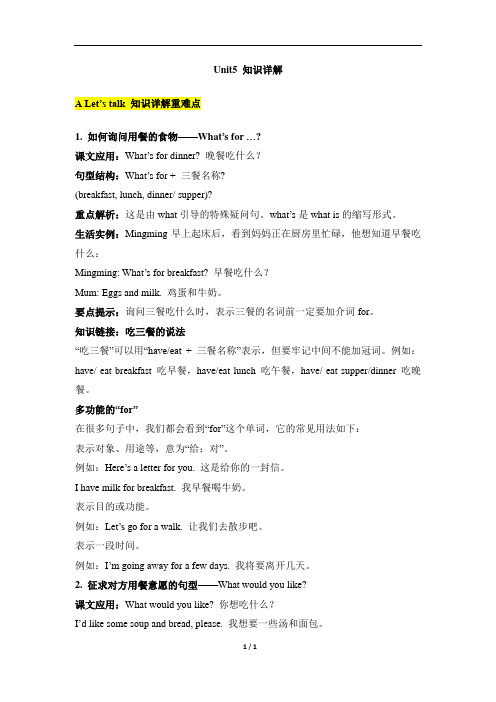
Unit5 知识详解A Let’s talk 知识详解重难点1. 如何询问用餐的食物——What’s for …?课文应用:What’s for dinner? 晚餐吃什么?句型结构:What’s for + 三餐名称?(breakfast, lunch, dinner/ supper)?重点解析:这是由what引导的特殊疑问句。
what’s是what is的缩写形式。
生活实例:Mingming早上起床后,看到妈妈正在厨房里忙碌,他想知道早餐吃什么:Mingming: What’s for breakfast? 早餐吃什么?Mum: Eggs and milk. 鸡蛋和牛奶。
要点提示:询问三餐吃什么时,表示三餐的名词前一定要加介词for。
知识链接:吃三餐的说法“吃三餐”可以用“have/eat+ 三餐名称”表示,但要牢记中间不能加冠词。
例如:have/ eat breakfast 吃早餐,have/eat lunch 吃午餐,have/ eat supper/dinner 吃晚餐。
多功能的“for”在很多句子中,我们都会看到“for”这个单词,它的常见用法如下:表示对象、用途等,意为“给;对”。
例如:Here’s a letter for you. 这是给你的一封信。
I have milk for breakfast. 我早餐喝牛奶。
表示目的或功能。
例如:Let’s go for a walk. 让我们去散步吧。
表示一段时间。
例如:I’m going away for a few days. 我将要离开几天。
2. 征求对方用餐意愿的句型——What would you like?课文应用:What would you like? 你想吃什么?I’d like some soup and bread, please. 我想要一些汤和面包。
句型结构:问句:What would you like?答语:I’d like some + 食物(eggs, soup, bread…).重点解析:would like是固定短语,意为“想要”。
Unit 5 The colourful world Part A 教案人教PEP2024英语三年级

Part A (Let'slearn&Listen and chant)
板书设计:
11.引导学生用英语描述他们最喜欢的颜色,然后用英语和一幅画作描绘自己喜爱的一个场景,并进行同伴互评。
12.学习小结。
教师需开展小组讨论,最后分享作品,学习彼此的作品,观察学生的交流能力和创造性表达。
设计意图:以上教学过程结合了词汇教学、综合应用,旨在使学生在多个层面上掌握并运用颜色词汇,提升英语学习的兴趣和实际运用能力。教师应根据课堂实际情况灵活调整教学步骤,以适应不同学生的学习需求。
How文体结构&语言特点
文体结构:Let'slearn采用词汇列表配图的形式,简洁明了;Listen andchant则以歌曲或童谣的形式呈现,结构灵活,富有韵律感。
语言特点:使用简单易懂的语言,重点突出颜色词汇,通过重复和押韵的方式加深学生的记忆。
Why 语篇意图&语篇价值
语篇意图:通过Let'slearn和Listen andchant两个部分,帮助学生掌握基本颜色词汇,同时培养学生的语感和节奏感。
应用实践
3.运用拟人的手法,将自己虚拟为动植物,按照一定顺序描述颜色变化。
知识迁移
4.让学生绘制一幅包含多种颜色的画,并用英语描述画作。
教学重点及难点
1.掌握Let'slearn中的基本颜色词汇。
2.能够跟唱Listen andchant,并理解其大意。
3.在实际情境中灵活运用所学颜色词汇进行交流。
What主题意义&主要内容
单元主题:颜色
该主题属于“人与自然”范畴,具体归入“感知与表达”主题群,涵盖“色彩认知与情感表达”子主题内容。
PEP小学英语六年级上册Unit5单元整体教学设计

PEP小学英语六年级上册Unit5单元整体教学设计Unit 5 单元介绍本单元的主题为 "My House",是小学英语六年级上册教材的第五单元。
本单元的学习内容主要是家庭成员、家居设施、房间等。
属于学生生活中比较熟悉的话题,符合学生的实际情况和生活经验,容易启发学生的学习兴趣和主动性。
同时,本单元配有丰富的图片和视频资源以及生动的练习活动,能够有效促进学生的听、说、读、写各方面的英语语言应用能力的提升,更好地实现英语教学的目标。
整体教学目标1. 熟练掌握单词: house, room, kitchen, bathroom, bedroom, living room, parents, brother, sister, grandpa, grandma, aunt, uncle 等。
2. 能够正确使用单词表达与家庭成员有关的信息,如我家有多少人,谁是爸爸、妈妈、哥哥、姐姐、爷爷、奶奶等。
3. 能够听懂和理解与家庭、房间等相关的英语口语对话,并能回答与对话相关的问题。
4. 能够正确描述各种家居设施和不同房间的功能及布置等。
5. 能够完成相关的阅读理解和写作练习,提高英语语言运用水平,增强英语交际能力。
整体教学准备本单元的教学准备工作主要包括教学资料的准备、教学工具的准备和课件的制作等。
具体的教学准备如下:1. 教学资料的准备:教材、教学PPT、练习册、家庭生活图片等;2. 教学工具的准备:多媒体设备、投影仪、录音机、纸笔等;3. 课件的制作:制作与本单元相关的PPT课件、图片、图片集等。
整体教学设计本单元的整体教学设计分为三个部分,分别是教学前期准备、教学过程和总结复习。
下面的内容将分别对这三个方面进行详细的说明。
一、教学前期准备教学前期准备主要是布置教室、介绍教学目标、激发学生学习英语的兴趣并引入本单元中的话题。
从教室环境布置上,可以贴一些与本单元相关的图片、单词卡片和海报,使学生能够尽早领会学习内容的主题,增强英语课堂氛围。
人教版八年级英语上册Unit5语法课优秀教学案例
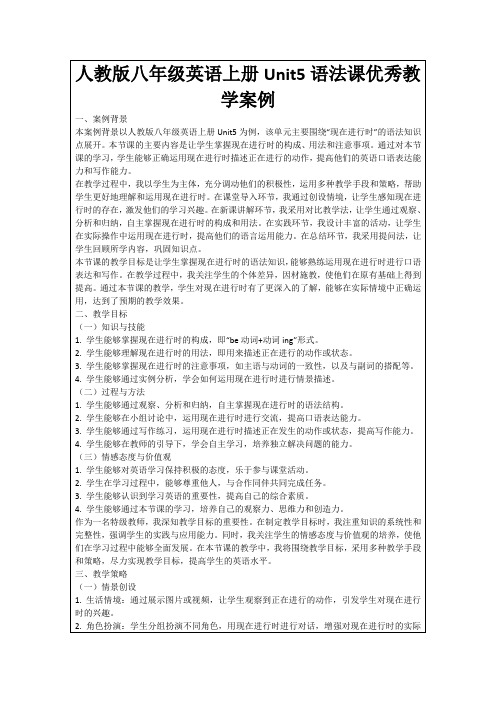
二、教学目标
(一)知识与技能
1.学生能够掌握现在进行时的构成,即“be动词+动词ing”形式。
2.重点强调:教师强调现在进行时的注意事项,如主语与动词的一致性,以及与副词的搭配等。
3.巩固知识:通过一些练习题,让学生巩固所学的现在进行时的知识。
(五)作业小结
1.作业布置:布置一些相关的作业,让学生巩固所学的知识,如用现在进行时写一篇小短文。
2.作业反馈:教师在下一节课开始时,对学生的作业进行反馈,指出作业中的错误,并帮助学生改正。
3.亮点三:小组合作的互动性
在学生小组讨论环节,学生分组讨论现在进行时的用法,分享学习心得,互相促进。通过小组竞赛和合作完成任务,学生能够在互动中运用现在进行时,提高学习兴趣和合作精神。这种小组合作的互动性,培养了学生的团队合作能力和语言运用能力。
4.亮点四:反思与评价的深度
在教学过程中,我引导学生进行自我反思和同伴评价,让学生总结现在进行时的掌握情况,并给予意见和建议。同时,我对学生的学习情况进行评价,肯定优点,指出不足,促进学生的持续发展。这种反思与评价的深度,使学生能够更好地了解自己的学习情况,提高自我改进的能力。
(三)学生小组讨论
1.任务分配:将学生分成小组,每组分配一个任务,如分析一段对话或短文,找出其中的现在进行时句子。
2.小组讨论:学生分组讨论,分享自己的发现和理解,互相交流和学习。
3.分享成果:每个小组选出一个代表,向全班分享他们的讨论成果,共同学习和提高。
高中英语Unit 5 Travelling abroad知识讲解 话题语言应用——出国学习或旅游教案
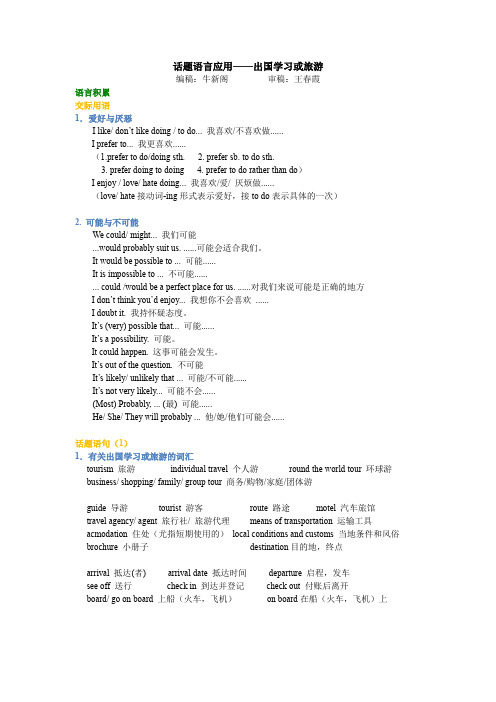
话题语言应用——出国学习或旅游编稿:牛新阁审稿:王春霞语言积累交际用语1.爱好与厌恶I like/ don’t like doing / to do... 我喜欢/不喜欢做......I prefer to... 我更喜欢......(1.prefer to do/doing sth. 2. prefer sb. to do sth.3. prefer doing to doing4. prefer to do rather than do)I enjoy / love/ hate doing... 我喜欢/爱/ 厌烦做......(love/ hate接动词-ing形式表示爱好,接to do表示具体的一次)2. 可能与不可能We could/ might... 我们可能...would probably suit us. ......可能会适合我们。
It would be possible to ... 可能......It is impossible to ... 不可能......... could /would be a perfect place for us. ......对我们来说可能是正确的地方I don’t think you’d enjoy... 我想你不会喜欢......I doubt it. 我持怀疑态度。
It’s (very) possible that... 可能......It’s a possibility. 可能。
It could happen. 这事可能会发生。
It’s out of the question. 不可能It’s likely/ unlikely that ... 可能/不可能......It’s not very likely... 可能不会......(Most) Probably, ... (最) 可能......He/ She/ They will probably ... 他/她/他们可能会......话题语句(1)1.有关出国学习或旅游的词汇tourism 旅游individual travel 个人游round the world tour 环球游business/ shopping/ family/ group tour 商务/购物/家庭/团体游guide 导游tourist 游客route 路途motel 汽车旅馆travel agency/ agent 旅行社/ 旅游代理means of transportation 运输工具acmodation 住处(尤指短期使用的)local conditions and customs 当地条件和风俗brochure 小册子destination目的地,终点arrival 抵达(者) arrival date 抵达时间departure 启程,发车see off 送行check in 到达并登记check out 付账后离开board/ go on board 上船(火车,飞机)on board在船(火车,飞机)上boarding pass 登机证traveller’s cheque 旅行支票tourist/ traffic map 观光/交通地图exit/ entry/ transit visa 出境/入境/过境签证make plans 制定计划apply for a visa/ passport 申请签证/护照provide sb. with all the necessary expenses 提供所有必需的费用letter of application 申请信 application form 申请表tuition fee 学费cost of living 生活费用admission office 录取办公室o versea students office 外籍学生办公室host family接待留学生的家庭homestay 在当地居民家居住期间话题语句(2)出国学习的优缺点(Advantages/disadvantages of studying in a foreign country)Advantages (优势):It will help us to be independent. 有助于我们独立。
- 1、下载文档前请自行甄别文档内容的完整性,平台不提供额外的编辑、内容补充、找答案等附加服务。
- 2、"仅部分预览"的文档,不可在线预览部分如存在完整性等问题,可反馈申请退款(可完整预览的文档不适用该条件!)。
- 3、如文档侵犯您的权益,请联系客服反馈,我们会尽快为您处理(人工客服工作时间:9:00-18:30)。
话题语言应用-伟人的生活语言积累交际用语Asking for opinions(征求意见)1. What do you think of...? 你认为……怎么样?2. What are your ideas? 你有什么看法?3. How do you feel about that? 你对……感觉如何?4. What’s your opinion? 你的看法怎样?5. Do you have any thoughts on that? 你对那事有什么看法?6. Why do you think so? 你为什么这么认为呢?Giving opinions(发表意见)1. I think/ I don’t think... 我认为(不)……2. I believe/ I don’t believe.... 我认为(不)……3. In my opinion, ... 我认为……4. I’m with you. 我同意你的看法。
5. To my understanding, ... 依我理解……6. I feel that..../ I don’t feel that... 我感觉……/ 我没有感觉……【高清课堂:unit5语言应用】,话题词句Who are Heroes?Chairman Mao:the founder of People’s Republic of ChinaSun Yat-sen: He led the 1911 revolution and founded the first Republic of China.Nelson Mandela: South Afric a’s first black president and won the Nobel Prize in 1993.◆Heroes are those who make great contributions to the social development and well-being of human life.Kai-Fu Lee: the founding president of Google ChinaLiu Xiang: an Olympic Gold medalist and World ChampionJackie Chan: famous film star as a Chinese cultural icon◆Heroes are those who work all their ways to gain success in their careers.Sang Lan: former member of the national women's gymnastic team, after severe spinal injuries, study and work optimistically.Hellen Keller: an American author, political activist and lecturer, the first deaf-and-dumb person to earn a Bachelor of Arts degree◆Heroes are those who face difficulties in life and challenge bravely.A teacher in a remote villageA policeman saved a drowning child◆Heroes are those who help or save others with no hesitation.Are you a hero?◆拓展阅读Nelson Mandela’s Life Story“During my lifetime I have dedicated myself to the struggle of the African people. I have fought against white domination, and I have fought against black domination. I have cherished the ideal of a democratic and free society in which all persons live together in harmony and with equalopportunities. It is an ideal which I hope to live for and to achieve. But if needs be, it is an ideal for which I am prepared to die.”——Nelson MandelaNelson Mandela is a former president of South Africa from May 1994 to June 1999. He is one of the great moral and political leaders of that time. He is an international hero whose lifelong contribution to the fight of anti-apartheid(反对种族隔离)activities in South Africa won him the Nobel Peace Prize. Apart from the glory, he suffered 27 years imprisonment(监禁)which was from August 1962 to February 1990.For the people in South Africa, he is a champion(捍卫者). He was born in a rich family, he should live in a happy life, but he didn’t. He devoted himself to fighting for the equality and peace for the black people. He won p eople’s respect and love all over the world through his pertinacious (持久的)fighting will, strong perseverance(不屈不挠), broad mind, clear-cut standpoint(明确的立场), and noble personalities.He became the symbol of justice and kindness. He became the idol and hero of South Africa. He became the first black President of South President.Early LifeMandela was born on July 18, 1918 in Mvezo, a small village located in the district of Umtata(乌姆塔塔,南非东南部城市,特兰斯凯). His father was a chief of the town of Mvezo. His father had four wives and 13 children (4 boys and 9 girls). Mandel was born to his third wife.His full name is Nelson Rolihlahla Mandela(纳尔逊·罗利赫拉赫拉·曼德拉). The explanation of his name: Nelson is his first name, He was the first member of his family to attend a sc hool, and his teacher gave him the English name “Nelson”. Rolihlahla is his given name. It means to pull a branch of a tree, kind of troublemaker. Mandela is his surname. One of the King’s sons, named Mandela was his grandfather, and then Mandela became the source of his surname.His father died of tuberculosis(矽肺结核)when he was 9 years old. He was a really smart student when he was at school. He got his certificate in two years instead of the usual 3 years. He was an excellent stick-fighter as a child, and he liked boxing and long-distance running. Later, he was known to enjoy playing football and dancing as well.He set his mind to be a lawyer because of a Professor who was very arrogant(傲慢的)to say that black people couldn’t be good lawyers. From then on, he determined to be a lawyer and studied law in university. He thought law was a good weapon to release black people from the political bondage(奴役)of white people. When he was 23, he went into the city. He escaped the marriage which the Regent(摄政者)arranged for him.Anti-Apartheid ActivitiesBlack South Africans had few rights, and they would have been less after the election of 1948. Blacks were compelled(强迫)to live in different parts of the city, and were forced to live in far worse conditions than whites. Mixed marriages were forbidden and Africans faced arrest if they didn’t carry passbooks. Those are the symbol of black oppression.Mandela began to fight back. He joined in the successful mass boycott(抵制)of the city’s buses after an increase in fares. In 1944, Mandela took part in the ANC Youth League, which was adopted by the ANC in 1949. It is the main black political group. Mandela thought he should be the leader to lead the black Africans’ liberation.In 1961, Mandela became the leader of the ANC’s armed wing. He organized sabotage(破坏)campaigns against military and government targets to end apartheid(种族隔离).Mandela described that the ANC, in its struggle against apartheid, also violated human rights, sharply criticized those in his own party who attempted or removed statements supporting this fact from the reports of the Truth and Reconciliation Commission(真相与和解委员会).The consequence of anti-apartheid activity was that Mandela and ANC party members were barred(阻止)from entering the United States, except the United Nations headquarters in Manhattan. Their South African apartheid regime was regard as terrorism, they were regarded as terrorists.Prison LifeAfter Mandela led these anti-apartheid activities, he spent 27 years in the prison. His life in prison was really a struggle, and hard. He still said that he would never give up fighting for the blacks though he was imprisoned.He was arrested on August 5, 1962. At that time, he was sentenced to 5 years in prison with hard labor. In June 1963, Mandela was taken to the Rivonia Trial. Finally, the judge declared that the 5 years’ prison life became a lifelong imprisonment.During his years in prison, Nelson’s reputation grew steadily. He was regarded as the most significant black leader in South Africa. He consistently refused to compromise his political position to obtain his freedom.While he was in prison, there were 3 people watching on him, since he was a special terrorist. He did have a tough time by doing hard labor things in the prison. On a sunny day, the glare from the white rock is blinding, but he was refused the use of dark glasses. His eyesight never fully recovered. What was worse, he was allowed one visitor and one letter every 6 months. For him, those were just small things. With his persistence, he became the prisoners’ leader and spokesman. The prison became a political workshop for them.Nowadays, Robben Island, off the coast of Cape Town where Mandela was imprisoned is a major tourism in South Africa. The visitors are totally attracted to go there by Mandela’s story.FreedomIn 1990, Mandela was released. He was known as one of the most famous politicians on the planet.Though he was in prison, he was still the global focus. His charisma and influence were all over the world. In 1981, about ten thousand French people applied for the Sout h Africa’s embassy in France to release Mandela. In 1982, in the global 53 countries’ 2000 mayors put their signatures for getting Mandela’s freedom. In 1983, in Britain, there were 78 councilors and more than 50 mayors held a parade to ask Britain Prime to stress South Africa to give Mandela freedom.On February 11, 1990, Mandela was released with no reason. The government of South Africa couldn’t fight for the international campaign.After his release, he still worked hard and succeeded in ending the apartheid era, saving South Africa from a threatened civil war. It showed how skillful and capable he is in political aspect. Mandela’s leadership got through a lot of negotiations, as well as his relationship with President F.W.de.Klerk. They were together awarded the Nobel Peace Prize in 1993.Nelson Mandela succeeded in becoming the first black President in South Africa on April 27, 1994. As a president, he did his best to reconcile with Afrikaners. He delighted Afrikaners by wearing a Springbok shirt at a rugby which is Afrikaners’ favorite sport. The 1995 Rugby World Cup in South Africa was widely seen as a major step in the reconciliation of Afrikaners andblacks.Since then, for Mandela, for the blacks, they really got freedom from Afrikaners.Personal LifeFor Mandela, his public life was hard, but successful. For his private life, it was completely a tragedy. He has been married for 3 times. He had 6 children, but 3 of them died during Mandela’s lifetime.Mandela’s first wife, Evelyn Mase, was a young cousin of his friend’s. She was a nurse who worked at the Johannesburg General Hospital. They got married in 1944. They were very different. She was very religious and had little interest in politics. Mandela was always absent at home because of the politics. That was the main reason why they got divorced in 1957. They had 4 children, two sons and two daughters. His first son Thembi died in a car crash and his second son Mkgatho died of AIDS. Their daughter Makaziwa died at the age of 9 months, their second daughter was also called Makaziwa who is still alive.Mandela’s second wife, Winnie Makizela, was a young and attractive first black social worker. They got married in 1958. She soon developed into a political activist in her own right. Mandela really like Winnie. Her visits and her letters helped him through the long years in prison. They divorced in 1996 because of political estrangement. They had 2 daughters, Zenani and Zindziswa.On his 80th birthday, Mandela had his third marriage. He married Grace Machel who was a widow of the former Mozabican President. Until now, they’re still together, but they are too old to have a child.RetirementMandela became the oldest elected President in South Africa. He steeped down as President in 1999, and Thabo Mbeki became the next President.Though he retired from the President, he still involved in education projects, in the fight against AIDS. He used his prison number to help promote AIDS awareness campaigns.Mandela urged South Africans to use condoms and to wait until their late teens to have sex, and a new figure showed that the majority of AIDS were decreasing.On November 11, 2009, the United Nations General Assembly announced that Mandela’s birthday July 18th will be “Mandela Day” for praising his co ntribution to the world peace and freedom.Nelson Mandela is arguably the greatest and most loved statesman of the past century. He is a legend. He is a true icon who never compromised. He has received more than 250 awards. People regarded him as a great President of South Africa and one of the great moral leaders of their time. 写作运用单元写作:本单元的写作内容为描述伟人或名人,大多是对某个人物的生平进行介绍,介绍内容为人物生平最基本的信息和最重要的事迹。
